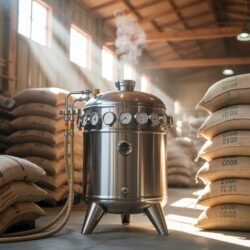Introduction: Setting the Stage for a new coffee era
If you’ve been following the world of specialty coffee, you know it’s a constantly evolving landscape—full of innovation, passion, and the pursuit of the perfect cup. As someone who has dedicated my career to coffee, and specifically to championing the voices of coffee growers, I want to invite you on a journey. Today, I’m making a case for something I feel deeply: that we are on the cusp of a new era in coffee, one that will be defined by the incredible possibilities of anaerobic fermentation. I believe this movement is not just another trend, but the true fourth wave of coffee. And in this article, I’ll explain why—and why it matters for the future of coffee, from farm to cup.
The First Three Waves: A Brief Reflection
The First Wave: Coffee for the Masses
The first wave of coffee was all about accessibility and convenience. Coffee became a daily staple, found in every home and diner, fueling generations with its comforting aroma and caffeine kick. This era was defined by instant coffee, canned grounds, and a focus on quantity over quality—coffee was a commodity, not an experience.
The Second Wave: The Rise of Specialty Coffee
The second wave ushered in a new appreciation for quality and origin. Brands like Starbucks and Peet’s Coffee introduced consumers to espresso-based drinks, single-origin beans, and café culture. Coffee became more than just a beverage; it was a lifestyle, and consumers began to care about where their coffee came from and how it was brewed.
The Third Wave: Coffee as Craft
The third wave transformed coffee into an artisanal craft. Roasters and baristas focused on transparency, direct trade, and meticulous brewing methods. The emphasis shifted to terroir, processing, and the unique story behind every cup. Coffee lovers sought out micro-lots, experimental processing, and the perfect pour-over, elevating coffee to the level of fine wine.
The Case for the Fourth Wave: Anaerobic Coffee Processing
1. A Paradigm Shift Rooted at the Farm
I believe we are standing at the threshold of the fourth wave of coffee, and it is being driven by the revolutionary potential of anaerobic fermentation. Unlike previous waves, this movement is not led by roasters or baristas—it begins at the farm, right after harvest, in the hands of the coffee producers themselves. Anaerobic fermentation is a process that can only be controlled and executed at origin, giving growers unprecedented power over the final cup profile and value of their coffee. For the first time, producers are not just suppliers; they are innovators, crafting flavors and narratives that are impossible to replicate elsewhere.
2. Unlocking New Flavor Frontiers and Economic Opportunities
Anaerobic fermentation creates coffees with flavor profiles that were previously unimaginable—tropical fruit, wine-like acidity, floral and spice notes, and a syrupy sweetness that captivates the palate. This isn’t just a new taste; it’s a new language for coffee. As these unique profiles command higher prices and greater demand on the global stage, the economic benefits flow directly to the producers who control the process. This is a seismic shift: the value chain is being rebalanced, with farmers finally in the driver’s seat, able to demand more for their craft and expertise.
3. Changing the Industry Forever—With Producers at the Helm
My vision is for coffee growers to control this narrative, shaping the future of coffee with their creativity and knowledge. Anaerobic fermentation is not a trend—it is a fundamental change in how coffee is produced, valued, and experienced. As the world adapts to these new flavors and the stories behind them, I predict that anaerobically fermented coffee will be embraced everywhere, transforming the industry and empowering those who have long been at its foundation. This is the fourth wave: a movement where innovation, quality, and economic empowerment start at the farm and ripple outward, changing coffee forever.
Conclusion
As the founder and CEO of Javabooch, I am dedicated to bringing awareness to anaerobic coffee fermentation and advocating for a future where producers have more say, more control, and more revenue. The fourth wave is here—and it belongs to the growers. Let’s recognize and celebrate this new era for what it truly is: a revolution in coffee, from the ground up.


